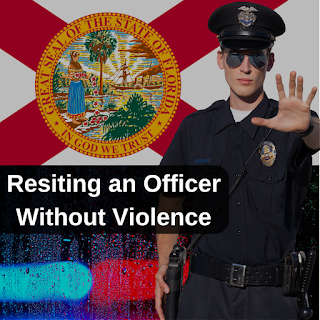Arrested for Resisting Without Violence in Florida? Essential Facts to Know
If you've recently been charged with resisting without violence in Florida, understanding the nature of this charge, the potential penalties, and relevant case law is crucial. In this blog post, we'll provide key information to help you navigate this complex situation. While it's important to be well-informed, seeking the assistance of an experienced criminal defense attorney, such as Jeff Lotter, can significantly improve your chances of achieving a favorable outcome.
Understanding the Charge:
Resisting without violence, as outlined in Florida Statute § 843.02, is a criminal offense that involves resisting, obstructing, or opposing a law enforcement officer or other authorized individuals without using or threatening violence while they are carrying out their legal duties. This offense is classified as a first-degree misdemeanor in Florida.
Relevant Case Law:
Several Florida cases have addressed the issue of resisting without violence, providing insight into how courts interpret this offense. Some notable examples that highlight the seriousness of the charge include:
State v. Dominguez: The court held that pulling away from an officer attempting to arrest the defendant constituted resisting without violence.
M.P. v. State: The court found that the defendant's act of attempting to walk away while an officer was trying to handcuff him constituted resisting without violence.
G.J.M. v. State: The court ruled that the defendant's refusal to exit his vehicle when ordered to do so by an officer constituted resisting an officer without violence.
These cases demonstrate that courts can interpret resisting without violence broadly, and it is essential to understand the potential implications of your actions in your specific case.
Potential Penalties:
As a first-degree misdemeanor in Florida, the maximum penalties for resisting without violence are:
- Up to one year in jail
- Up to one year of probation
- A fine of up to $1,000
The Importance of Legal Representation:
While it's essential to understand the law, penalties, and relevant case law surrounding resisting without violence charges, navigating the legal system can be complex and challenging. An experienced criminal defense attorney like Jeff Lotter can help you better understand your case, identify weaknesses in the prosecution's case, and develop a strong defense strategy tailored to your situation.
Jeff Lotter's clients have praised his knowledge, professionalism, and ability to approach each case carefully and in a timely manner. His expertise in the field and dedication to achieving the best possible outcome for his clients make him a valuable resource for those facing a resisting without violence charge in Florida.
Conclusion:
If you've been charged with resisting without violence in Florida, it's crucial to be well-informed about the charge, potential penalties, and relevant case law. Seeking the assistance of an experienced criminal defense attorney like Jeff Lotter can help you navigate this challenging situation and improve your chances of a favorable outcome. Don't hesitate to reach out to a legal professional for guidance and support as you face this charge.
[Call to Action: Contact an Experienced Criminal Defense Attorney]

.png)

Comments
Post a Comment